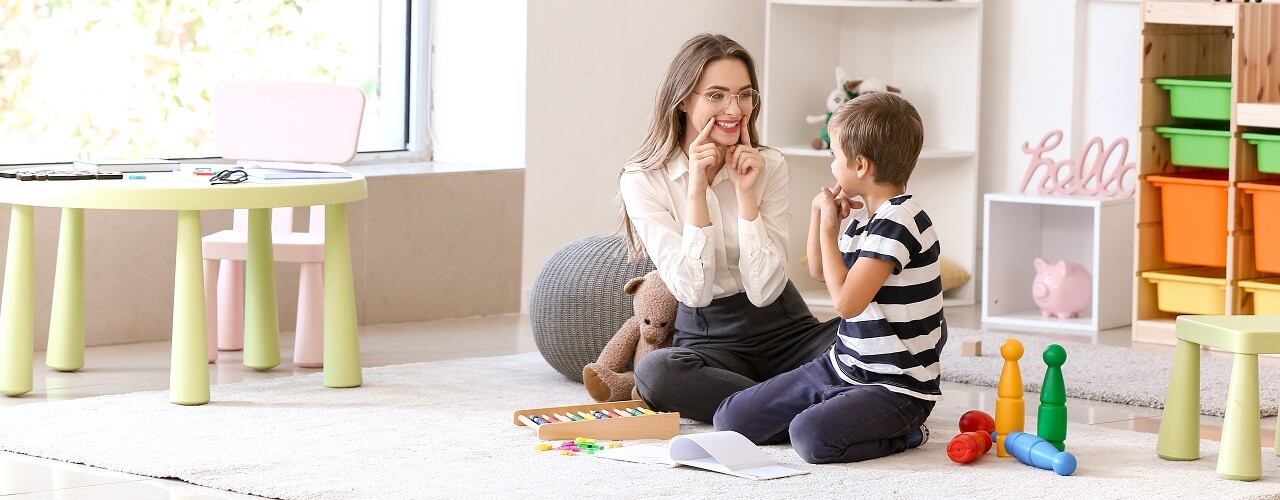Parents look forward to their child’s first steps. It’s an exciting event and is sure to make an adorable home video to watch for years to come if you’re lucky enough to catch it with your phone or a camera! However, if you’re concerned because your child has not yet begun to walk, know that you’re not alone. Late walkers can cause concern, and a pediatric physical therapist can provide comfort and guidance with physical therapy.
If your child needs assistance with their walking abilities, a pediatric therapist at Endeavors Pediatric Therapy could offer guidance.
Give our clinic a call today to schedule an appointment with our Physical Therapists, and rest assured that your child is in good hands.
How to know if your child should see a pediatric physical therapist
You might be reading this and wondering, “When should I take my little one to see a physical therapist?” Good question!
Let’s look at typical development to help answer that.
As stated by ChoosePT,
“A developmental delay is diagnosed when a child is assessed as being more than ‘a little behind’ in performing everyday skills. The term defines a substantial lag in performance and may be used to describe any type of delay in 1 or more of the following five skill areas:
- Activities of daily living
- Speech and language
- Social and emotional
- Cognitive (thinking)
- Fine and gross motor (movement)”
Now, let’s look specifically at the gross motor skill of walking. According to Pathways.org, infants will start pulling themselves up to stand and cruise along furniture around 10-12 months and begin to walk independently between 13-18 months.
Late walking is a common developmental delay addressed by pediatric physical therapists. If you are concerned about your child, contact us at Endeavors Pediatric Therapy for an evaluation.
Factors contributing to the late development of walking
Gross motor delays may or may not result from a specific medical condition. For example, a child with Down syndrome (DS) is identified at or before birth as having the condition but also can have developmental delay.
Children with autism or cerebral palsy also may demonstrate late development of walking. However, kids without a specific medical condition may still have some challenges from parenting styles, cultural norms, or life situations.
Pediatric physical therapists can assist in determining the cause and developing an appropriate treatment plan.
Early assessment is key, so when developmental progress is questioned, the family and health care providers need to address it immediately.
What to expect with pediatric physical therapy
To assess your child, a physical therapist will perform a complete evaluation. This evaluation will include:
- A parental interview including the child’s medical history
- Standardized assessments such as the Bayley Scales of Gross Motor Development or the Peabody Developmental Gross Motor Scale
- Assessment of your child’s range of motion and strength
- Primitive reflex testing
- Observation of movement patterns, including balance and coordination
Treatment will include fun activities that will encourage your child to walk. Platform swings can be used to promote balance. Elevated surfaces with toys can be positioned to promote pull to stand, cruising, and walking between supports. A home program will be developed with you to work on activities at home.
Just because your child is developing at a delayed pace doesn’t at all indicate they won’t be making those strides eventually! Many late walkers can overcome the delay and catch up with their peers without any further concerns. You can also do several things at home to encourage them to take those first steps.
Tips for parents to encourage walking at home
The best results come from a collaboration between parents and therapists so that a child receives consistent intervention outside of physical therapy sessions.
Here are a few ideas to promote independent walking at home:
- Let your child play barefoot. Being barefoot allows for functional strengthening and increased proprioceptive input. The use of shoes and orthotics can impede the development of gait.
- Make it fun to pull to stand and reach for toys. Safe and sturdy surfaces with fun and enticing items on top promote upright mobility.
- Engage in activities that require a lot of up-and-down movements. Reaching overhead and picking things up from the floor are great ways to build core strength.
- Encourage siblings and peers to challenge and cheer! Children love to model other children and try to keep up.
- Don’t panic. Children read stress and emotion and will sense if they are upset. Just play.
Consult with one of our physical therapists today
Remember: late development doesn’t mean your child won’t develop at all. We are all on our own timeline for our growth, development, and learning.
Talking to a pediatric physical therapist about healthy strategies to help your child take their first steps will ease your mind and give you a plan of action.
Contact Endeavors Pediatric Therapy to schedule an evaluation.
Sources:
- https://www.choosept.com/guide/physical-therapy-guide-developmental-delay
- https://pathways.org/all-ages/milestones/
Tags: Physical Therapy, Pediatric Therapy, physical activity, physical therapist



